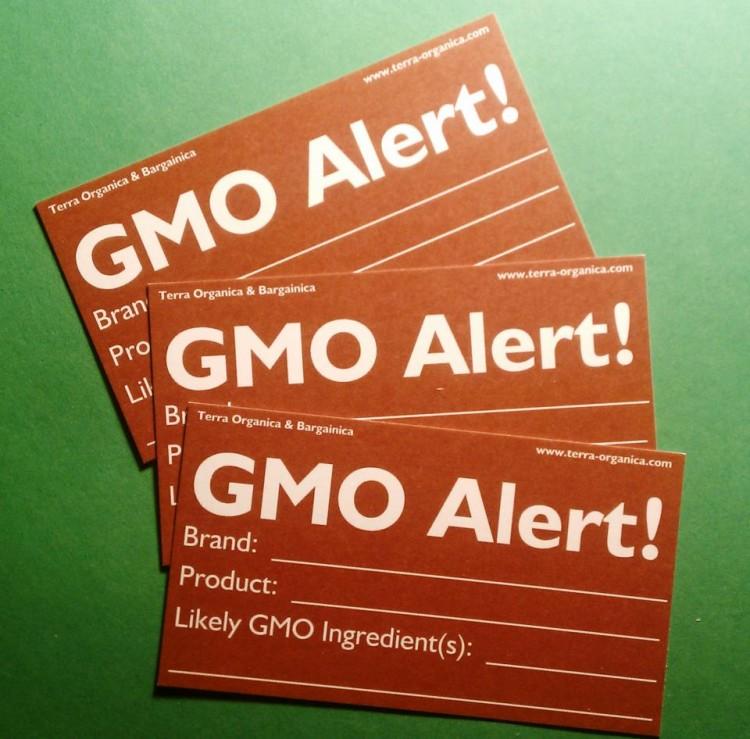
When it comes to food, Stephen Trinkaus has very high standards, but he also knows what it takes to run a business.
“I used to only have organic food in my store, and we could not make it,” said Trinkaus, owner of Terra Organica and Bargainica grocery store in Bellingham, Wash. “The reality is people are quite dependent on convenience food.”
American consumers might not always make the healthiest choices, but Trinkaus believes that they still deserve to know what they are eating. In an effort to clear up confusion, Terra began tagging all products that might contain genetically modified organisms (GMOs).
To avoid a “GMO Alert” label at Terra the rules are simple: “If a company has been able to show that their products are non-GMO, that they’ve been tested, certified, or certified organic—or if they’re even willing to print it on the label—then we won’t tag their products,” Trinkaus said.
It’s only been one week, but so far Terra’s efforts have won great praise from its customers—who now give more thought to what goes into their shopping cart. Trinkaus said that people have called from across the country and around the world to give their support.
The system is not perfect. Trinkaus cannot definitively say whether or not many of his tagged products actually contain GMOs because the U.S. Food and Drug Administration (FDA) mandates that it is not necessary for manufacturers to divulge this information.
“We only say ‘likely’ because we can’t prove it one way or the other,” Trinkaus said. “Ninety percent of canola, eighty-eight percent of corn, and ninety-four percent of soy grown in the U.S. is GMO. So if a product contains soy, and doesn’t say it’s organic, and it’s not verified to be GMO-free, it is likely that it is GMO.”
Terra’s in-house labeling scheme demonstrates an emerging trend in the quest for food transparency: if the law won’t grant a label for genetically engineered foods, maybe the market will.
Label Law Losing Streak
Both the biotech industry and the FDA are confident that GMOs are perfectly safe, but many are not so sure.
Experts estimate that between 75 and 80 percent of products on American grocery store shelves contain GMOs. While over 60 countries either label or ban genetically engineered ingredients, for 2 decades U.S. consumers and food safety advocates have been unable to get a label here.
California’s Proposition 37 was believed to have the best chance of changing the tide, when voters got to decide last November whether the state would mandate a GMO label. The vote was close, but the measure failed. While early polls showed good support for the ballot initiative, a $46 million industry advertising campaign against the measure prompted the public to shy away.
“It’s enormously powerful industries that are opposing this,” said labeling proponent and Right to Know Minnesota coordinator Nancy Brown. “They’re using their money to try to convince people that it’s not in their interest, even though this is something that people have clearly said that they want time and time again.”
Right to Know Minnesota is a campaign initiated by citizens concerned with GMO labeling legislation in the state.
Polls show that nine out of ten Americans seek a GMO label, but legislative progress has been slow. When a bill was introduced in Minnesota last year, the state House Agriculture Committee refused to hold a hearing. Brown hopes that increasing public awareness of GMOs will encourage lawmakers’ willingness to listen.
“There are a lot of people talking about it at the capital,” said Brown. “Granted, there’s a lot of biotech and industry money given to Agriculture Committee members, but we’re in a different place and we feel pretty confident about getting hearings.”
Sen. John Marty (D-Minn.) is behind a companion bill in the Minnesota Senate. He said that despite growing public demand, lawmakers are still holding back.
“They’re not ready to push for it this year, so we’re trying to build for it for next year,” Marty said. “Minnesota is a big agriculture state, and there will be lots of concern and opposition to it.”
Just like the GMO alerts at Terra Organica, the labels proposed in Minnesota and many other states specify nothing about health risks. The industry holds that any mention of GMO ingredients on a package will conjure a skull and crossbones in the mind of the consumer because many Americans have said that they would avoid products said to contain biotechnology.
Over the past few years, many products have adopted a non-GMO label to win consumer trust, but the question of GMO content has been a sticky issue for some retailers and food manufacturers—particularly Whole Foods Market.
The giant grocery chain is known for its organic choices, but when customers demanded a clear answer on the store’s GMO policy in 2011, Whole Foods confessed that bioengineered ingredients were used in its own private-label products.
When customers balked, the Whole Foods brand reformulated, but the company still carries several products thought to contain genetic engineering. In an effort to further protect consumer loyalty, the company now aims to be the first grocery chain to label GMOs.
“We heard our customers loud and clear asking us for GMO labeling,” wrote Whole Foods co-CEO Walter Robb along with President and COO A. C. Gallo in a March 8 Whole Foods blog post. “We are responding where we have control: in our own stores.”
Unlike Terra, Whole Foods is allowing its “supplier partners” as much as 5 years to either change their formulas or risk being labeled. Experts said that the influence is sure to have a ripple effect throughout the rest of the industry.
“The only way to get around the industry’s ability to block legislation is to get some significantly-sized businesses to start saying, ‘This is something we’re going to stay clear of,’” Marty said. “If a lot of these companies start stepping forward and say, ‘We’re going to be GMO-free,’ then the market can change it.”




